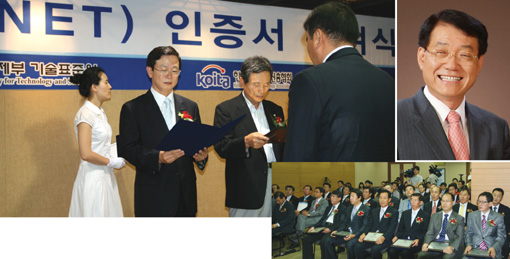World¡¯s First AC-DC Power IC Tech Certified as NET
36 new technologies added to NET list

The Korea Agency for Technology and Standards (KATS) announced a list of 36 technologies certified with the New Excellent Technology (NET) Mark and other certificates, the second list announced by the agency so far this year.
KATS, under the umbrella of the Ministry of Commerce, Industry and Energy, held a ceremony to present the 36 NET certificates at the Korea Industrial Technology Association building in Yangjae-dong, Seoul, on Sept. 27.
The total breaks down to 10 owned by large companies, 19 by SMEs, one by a research institute and the remaining six under joint research projects. By area, 10 are in the electrical/electronics field, two in the ICT sector, 15 in the machinery & materials sector, five in the chemical/bio tech field and four in the construction/environment sector.
Chung Ui-sik, director of the New Technology Promotion Division at KATS, said that attracting the most attention is Ace¡¯s development of integrated circuits compatible for alternating current (AC) or direct current (DC) without a transistor, inductor or a high-voltage balanced capacitor, considered to be the world¡¯s first original technology related to energy conservation through high-efficiency and the minimizing of standby power. The leading technology in the non-memory semiconductor market would reduce production costs by half through the simplification of the assembly process by replacing the existing components, thus leading to the effect of substituting 220 billion won worth of imports in the next five years.
Also noteworthy is Hyundai Motor-Kia Motors¡¯ development of a diesel engine compliant with the Euro 5 emission standard. The certification is about the development of a cleaner, quieter and more fuel-efficient diesel engine for compact passenger vehicles. By combining advanced engineering know-how with state-of-the-art technologies such as ¡°idle stop & go¡± (ISG), a variable geometry turbocharger (VGT), a variable swirl control system, a close-coupled diesel particulate filter (DPF) and an electronically controlled exhaust gas recirculation (EGR) cooling system, the engine development team was able to reach a highly competitive status.
The latest technology is not only in keeping with the government¡¯s low-carbon, green-growth policy paradigm, but it also actively meets with a trend of favoring small-sized, higher mileage cars stemming from crude oil price hikes and the global economic recession. Hyundai is the first Korean automaker to develop an ISG, a technology designed to conserve energy when idling by stopping an engine when stopped and reactivating it when starting. The engine boasts best-in-class performance ¡ª a maximum of 128 PS (81 PS per liter) ¡ª something that could meet consumers¡¯ demand for a ¡°fun drive¡± and lead to downsizing the engine. nw
KATS President Nam In-suk delivers NET Mark certificates to holders of 36 technologies at a ceremony on Sept. 27.
3Fl, 292-47, Shindang 6-dong, Chung-gu, Seoul, Korea 100-456
Tel : 82-2-2235-6114 / Fax : 82-2-2235-0799